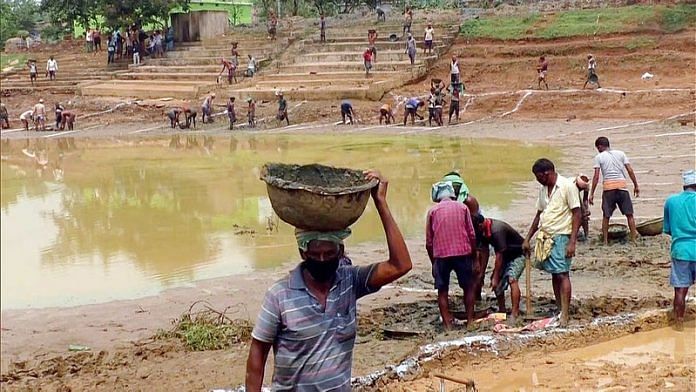New Delhi: Launched close to four years ago, the central government’s ‘Unnati’ initiative — aimed at imparting skill training to two lakh workers registered under Mahatma Gandhi National Rural Employment Guarantee Scheme (MGNREGS) — has received a poor response, with just 45,000 workers, or just 22.5 percent, having been trained so far.
Last month, the rural development ministry wrote to all state governments, urging them to take proactive measures to enroll eligible workers under the initiative and meet the balance target of training 1.55 lakh workers by the end of this fiscal, a senior ministry official said.
Union Rural Development Minister Giriraj Singh has blamed state governments for the poor response to the scheme. Addressing a press conference on 20 October, Singh said, “We got the Unnati scheme to push workers under MGNREGS towards sustainable livelihood. But state governments are not serious about it. So far, just 45,000 workers have been trained under Unnati. I urge the state governments to be more proactive in getting workers enrolled in the training programme.”
The Unnati project was launched in December 2019, though work on ground started in March 2020, with an aim to impart skill training to two lakh workers registered under MGNREGS till March 2022. According to the guidelines, a registered worker (in the 18-45 years age group) is eligible for training if the household has completed 100 days of work under MGNREGS. The worker is paid a stipend equivalent to the daily wage during the training period.
The project is aimed at upgrading the skill-base of workers so that they can “move from the current partial employment to full employment” and thereby reduce their dependence on MGNREGS. “In a growing economy, it is imperative that the workforce is migrated towards skilled work so that their incomes increase permanently in a significant manner,” according to the Unnati guidelines available on the ministry’s website.
The workers are given training under Deen Dayal Upadhyaya Grameen Kaushalya Yojana (DDU-GKY) and Rural Self Employment Training Institute (RSETI).
Till last year, just 27,383 workers could be trained, according to the ministry’s response to a Lok Sabha question in December.
Earlier this year, the ministry extended the deadline for the implementation of the project to March 2025 and also modified the guidelines so that more workers could be trained.
The ministry official quoted earlier said, “The project got a poor response initially due to the Covid pandemic and not many workers could get training in the first two years. Initially, only those households which had completed 100 days of work in the financial year 2018-19 were eligible. But following requests from state governments, we recently made changes in the guidelines, allowing any household that has completed 100 days of work to get one family member trained under Unnati. We are hopeful that we will be able to meet the target by the end of this financial year.”
But officials say that even after the amendments in the guidelines, the pace of enrollment of workers under Unnati is slow. “We have been pursuing the matter with state governments on a regular basis. We have recently written to them to focus on getting workers’ training done. The role of states and UTs is important in achieving the target,” said another official.
While the Centre claims that states aren’t doing enough, officials in states and UTs and activists cite a range of issues in the implementation of the project.
ThePrint has sought the ministry’s response on the issue and will update this report as and when it is received.
Also read: High deletion of names from MGNREGS rolls in poll-bound MP, Rajasthan, Chhattisgarh — NGO report
‘Training not enough, tech assistance must’
Under Unnati, workers under MGNREGS are provided training in two categories — self-employment and wage employment (to work in the service sector etc). The RSETIs offer training in 61 vocations classified under four major areas: agriculture, processing, product manufacture and general entrepreneurship development programme. Workers receive training in a range of activities, such as composting, bee-keeping, tailoring, dairy farming, and mushroom farming.
They are also trained in the service sector and provided placement opportunities in cities under DDU-GKY.
Unwillingness of workers to leave the village and get a job in cities, no financial and technical assistance to sell their products, difficulty in getting loans from banks etc. are some of the reasons activists and state officials cite regarding the poor response.
James Herenj, a member of the NREGA Sangharsh Morcha, a national association of activists and organisations for workers under MGNREGS, in Jharkhand said, “It is a good initiative, but there are serious implementation issues. What will a worker do with the training if he/she is not provided any financial support and market link to sell their products? This is the main reason why workers are not interested in getting trained. Moreover, it is difficult for them to get loans from the banks. They need some financial support to start any business.”
Another issue is that workers who have received training for wage employment are unwilling to go to cities or small towns for work, said the second official cited above.
When asked, the first rural development ministry official admitted that this is a concern. “This is where the state governments have to play a proactive role. They have to get the banks to provide loans and put in place a mechanism for workers to sell their goods.”
(Edited by Smriti Sinha)
Also read: Rajasthan, Assam to Telangana, states write to Modi govt seeking more work days under MGNREGS



